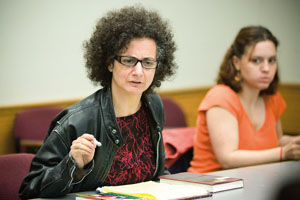Lauren Berlant, Professor in English Language & Literature and the Committee on African and African-American Studies
By Jennifer CarnigNews Office
 | |
Lauren Berlant, Professor in English Language & Literature and the Committee on African and African-American Studies, has had students for most of her life.
“The Abraham Lincoln version of my life is that I literally had a log cabin schoolhouse in my backyard,” says Berlant. The big sister was always helping her siblings with their homework, and the budding musician taught guitar to neighborhood children. “It just made sense to me from a very early age that I would be a teacher.”
Berlant has never lost that feeling. If anything, it has only grown stronger since she took her first teaching job in 1984 at the University. In the 20 school years that have passed and the hundreds of students she has worked with, Berlant says she has never regretted taking on the task of helping to shape the next generation of scholars.
“Students need to try out their voice as intellectuals, to see what it’s like to generate knowledge that’s surprising and contributes something significant,” she says. “I view my role as being a mechanism to help them develop their vocal and written, scholarly and conceptual, skills.”
And although she loves her work, Berlant admits it is never easy. More than once in a conversation about her style as an educator, she volunteers that she finds teaching “hard.”
“It’s not just classroom time or chapter reading or the office hours; it’s that you’re responsible for helping them elaborate the central questions they’ll be tracking during at least the early part of their career,” she says. “That’s a huge responsibility. I ask the question of myself all the time, ‘why is teaching exhausting?’ It’s not a physically demanding job. But you’re improvising everything that you do, and you’re constantly engaging in discussion with someone in the middle of working through an intellectual problem—so you’re being you plus a version of themselves that they aren’t yet, and that’s very complicated.”
Berlant adds another “teaching is hard” when she discusses the amount of experimentation and adaptation she engages in with every student interaction. “It’s all experimentation,” she stresses, “because one is always occupying someone else’s incomplete ideas, more complicated than any your archive can bear.”
Of course, working through big ideas is one of the aspects of academia that attracted Berlant to the field in the first place, as is a lifelong love of literature. Berlant earned her A.B. in English from Oberlin College and her M.A. and Ph.D. in English from Cornell University, with an emphasis on American literature, prose fiction and women’s studies. Today her work focuses mostly on questions of emotion, law and public life in the United States in the 19th and 20th centuries, but she also looks at aesthetics and the theory of gender, sexuality and racial formation, political andcritical theory, and psychoanalysis.
Her work in all of these areas is reflected in the classes she teaches. Graduate courses like The Intimate Public Sphere, The Case Study and From Sentiment to Trauma reflect the questions she is asking in her own work, rather than a canon of books she thinks every student should read. Her favorite question, she says, is, “How did it get to be that way?”
“Of course I’m interested in what’s developing in my work, but I don’t believe that teaching should be a form of discipleship or reproduction,” Berlant says, explaining that her goal as a teacher is simply to get students to maintain curiosity as well as rigor as they pursue their own projects.
She also aims to produce collaboration and intellectual solidarity among her students, and between her and her students. “I really reject the idea of virtuosic teaching.
“The students here are great—they really make you smarter,” she says, explaining that teachers ideally give themselves over to their students and their students’ projects.
“Tzvetan Todorov said that every time a new character enters a novel, there’s a whole new world of potential. The same is true of teaching. Students become a part of your intellectual attentiveness and reshape the way you read scholarship. Having your sense of what’s important organized by other people keeps things interesting.”
![[Chronicle]](/images/sidebar_header_oct06.gif)